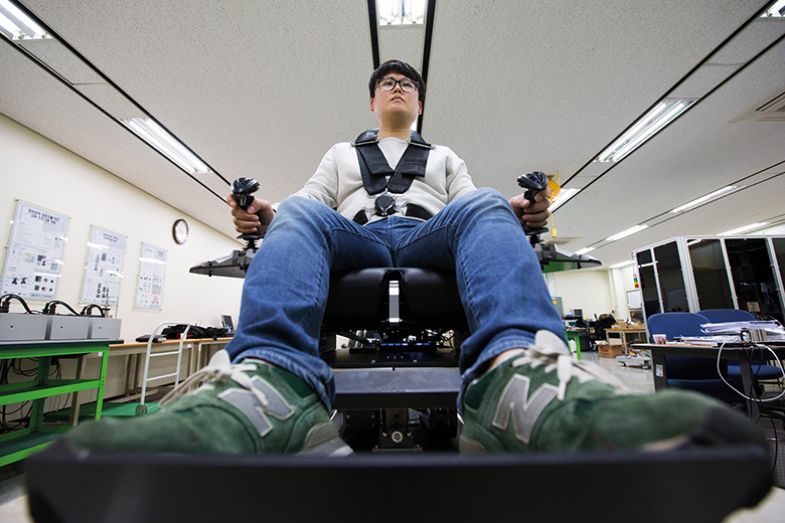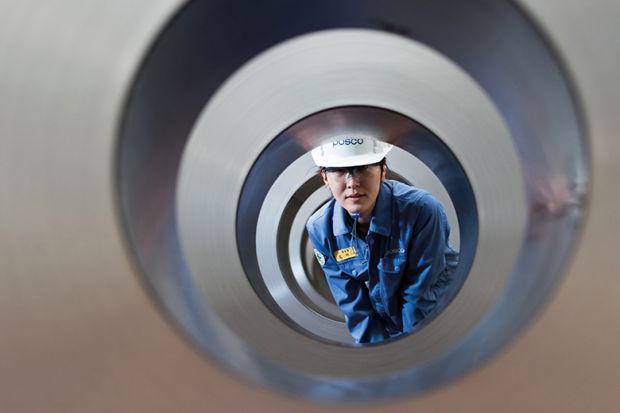Browse the full results of the World University Rankings 2021
It is not surprising that ties between business and academia are strong in Asia, a region where many rising young institutions have industry roots, and where many countries have only become developed in the past few generations.
The heads of start-up incubators and entrepreneurship programmes point to the importance of innovation on campus for job creation and nation-building – outcomes that have become even more pressing given the challenges of the Covid-19 pandemic.
Asian universities dominate the Times Higher Education World University Rankings metric for industry income (knowledge transfer), which measures an institution’s industry earnings, adjusted for its nation’s purchasing power parity and scaled against its number of academic staff. The figure suggests how much commercial funding and research support a university can attract relative to its size and the level of its country’s development.
Of the 19 universities with a perfect score of 100 in THE’s industry income metric, 11 are from Asia and the Middle East. South Korean institutions are among the top performers in this area, as many have industry built into their DNA.
The Pohang University of Science and Technology (POSTECH), which has a THE industry income score of 97.9, was founded by a steel company called POSCO in the 1980s, establishing South Korea’s first industry-academic-research cooperative system.
Sang Woo Kim, executive director of the university’s Research and Business Development Foundation, tells THE that collaboration between higher education and businesses was an important part of nation-building.
“Strong industry-academic partnerships from universities like POSTECH became the very foundation for Korea's astonishing growth – from an impoverished nation with agriculture as its primary industry in the early 1960s,” he says.
The university’s founding tenets are “to serve the nation and humanity by sharing the results achieved through industry-academic cooperation with industries and to cultivate the finest global talent through elite education”.
“The scale tips rather heavily on pragmatic collaborations that tangibly contribute to social and economic development,” Kim adds.
According to data from Clarivate Analytics, POSTECH published 13,545 papers – or 23 per cent of its total output – in conjunction with industry from 2007 to 2016. This figure is relatively higher than Western institutions known for knowledge or technology transfer.
Looking to the future, Kim says that POSTECH has begun developing new financial services with a Korean bank for the “untact” era – a concept in South Korea that refers to a future dominated by online interaction and automation – and will lead the development of advanced new drugs through the university’s “cutting-edge research infrastructure”.
“The pre-Covid-19 world no longer exists,” he says. “The social and industrial ecosystems have been forced into a completely new environment. In such a state, we universities must think about concrete cooperation.
“A strong collaborative system between universities and the private sector will be essential to overcome the economic downturn brought on by Covid-19 as well as other crises that humanity will face in the future.”
In particular, Kim believes that universities specialising in science and technology will be able to mitigate the issue of young people facing a difficult job market by supporting start-ups and “instilling an entrepreneurial spirit”.

The Korea Advanced Institute of Science and Technology (KAIST), which has a perfect THE industry income score of 100, also has industry roots. It was established in 1971 with backing from the US Agency for International Development and its business-friendly structure was shaped largely by Frederick Terman, a Stanford vice-president known as “the father of Silicon Valley”.
Today, KAIST offers a minor in science-based entrepreneurship, as well as a programme that integrates entrepreneurship and engineering. Its Institute of Technology Value Creation helps start-ups with commercialisation and finding business partners, while the Startup KAIST space allows new companies to hone practical skills.
KAIST also puts great emphasis on mentoring. It has about 100 advisers to help small and medium-sized enterprises (SMEs) procure parts and equipment crucial for the nation’s key semiconductor, energy and automotive industries.
Chang Kim, executive director of the Korean Association of Human Resource Development in South Korea, says that collaboration between universities and industry was emphasised even before Covid-19.
“Many Korean universities have been building their own hardware and software infrastructure for fostering start-ups for several years,” he says. “This movement can be attributed to college students’ growing interest in start-ups due to technological advances and global trends. We can easily find students who are willing to start their own business to fulfil their dreams, compared with the past.”
Even older universities in South Korea have opened their doors to business interests. Sungkyunkwan University (SKKU), which traces its roots back to the 14th century, reinvented itself in the 1960s with heavy backing by electronics giant Samsung and now has an industry income score of 98.1.
Meanwhile, Seoul National University, the nation’s top-ranked institution, is working to strengthen its ties to the technology and business sectors and has an industry income score of 97.8.
Park Won-Woo, a business school professor at Seoul National and the lead author of a report that recommends that the university creates a school of entrepreneurship and innovation, told local media outlet Pulse earlier this year that “business creation does not just mean doing business and making money”.
“It also means realising the dream of social contribution through value creation based on innovation and convergence,” he said.
Iranian powerhouse runs on autonomy and flexibility
Iran’s Sharif University of Technology (SUT), established in 1966, has a perfect THE industry income score of 100, despite the fact that sanctions against the country by other nations have taken a serious toll on its economy.
Arash Simchi, dean of international affairs at the institution, says that the university’s research centres have been designed to operate with relative autonomy within the larger university system and they provide researchers with “all sorts of help and flexibility”, including legal advice, support on joint research projects, access to venture capital and grants.
Scholars can also receive help on patents and the international commercialisation of technology products, while the Sharif Incubator aids in the creation and development of new enterprises.
Although Iran has been one of the Middle Eastern countries hardest hit by Covid-19, Simchi says that research activity was stalled only for about two months.
“With great determination and the tireless efforts of students and professors, we have recovered from that situation to almost 80 per cent [research capacity], based on professors’ reports,” he says. “We hope to [get back to] the lively pace at which research projects and higher education tasks were followed and progressed at SUT before this pandemic.”
Simchi adds that the university has launched smart systems for Covid-19 detection and control, designed sensitive kits for on-site detection of coronavirus, and produced disinfectants and sanitary items.
While he did not mention US sanctions against Iran specifically, there have been international calls for Washington to lift trade restrictions so that Iran can better fight the pandemic.
“It is of concern that some problems may arise in the mass production and distribution of products in the future in the wake of the socio-political sanctions,” Simchi says, citing issues such as a shortage of raw materials, licensing-related problems, and a lack of support for locally produced software “to cope with challenges such as Covid-19”.
“Undoubtedly, a decrease in communication with Western countries begets some difficulties.”
joyce.lau@timeshighereducation.com
Industry pillar
|
Rank in pillar |
Position in World University Rankings |
Institution |
Country/region |
Pillar score |
|
=1 |
1,001+ |
Turkey |
100.0 |
|
|
=1 |
801–1,000 |
Taiwan |
100.0 |
|
|
=1 |
83 |
Germany |
100.0 |
|
|
=1 |
801–1,000 |
Turkey |
100.0 |
|
|
=1 |
351–400 |
United Arab Emirates |
100.0 |
|
|
=1 |
96 |
South Korea |
100.0 |
|
|
=1 |
32 |
Germany |
100.0 |
|
|
=1 |
401–500 |
Uganda |
100.0 |
|
|
=1 |
201–250 |
Russian Federation |
100.0 |
|
|
=1 |
501–600 |
Taiwan |
100.0 |
|
|
=1 |
401–500 |
Russian Federation |
100.0 |
|
|
=1 |
1,001+ |
Iran |
100.0 |
|
|
=1 |
100 |
China |
100.0 |
|
|
=1 |
401–500 |
Iran |
100.0 |
|
|
=1 |
41 |
Germany |
100.0 |
|
|
=1 |
=20 |
China |
100.0 |
|
|
=1 |
=62 |
Netherlands |
100.0 |
|
|
=1 |
201–250 |
South Africa |
100.0 |
|
|
=1 |
=94 |
China |
100.0 |
|
|
20 |
501–600 |
China |
99.9 |
|
|
=21 |
=187 |
Netherlands |
99.8 |
|
|
=21 |
501–600 |
Iran |
99.8 |
|
|
=21 |
601–800 |
Brazil |
99.8 |
|
|
=24 |
=92 |
Switzerland |
99.7 |
|
|
=24 |
=20 |
United States |
99.7 |
|
|
=26 |
69 |
Canada |
99.5 |
|
|
=26 |
=187 |
South Korea |
99.5 |
|
|
=28 |
401–500 |
China |
99.4 |
|
|
=28 |
1,001+ |
Taiwan |
99.4 |
|
|
30 |
401–500 |
China |
99.1 |
|
|
31 |
501–600 |
China |
99.0 |
|
|
32 |
=78 |
Netherlands |
98.9 |
|
|
33 |
501–600 |
China |
98.7 |
|
|
34 |
401–500 |
China |
98.4 |
|
|
=35 |
351–400 |
Belgium |
98.1 |
|
|
=35 |
=101 |
South Korea |
98.1 |
|
|
37 |
=107 |
Germany |
98.0 |
|
|
38 |
151 |
South Korea |
97.9 |
|
|
39 |
60 |
South Korea |
97.8 |
|
|
40 |
=174 |
Russian Federation |
97.7 |
|
|
41 |
351–400 |
South Korea |
97.6 |
|
|
=42 |
251–300 |
China |
97.4 |
|
|
=42 |
201–250 |
Japan |
97.4 |
|
|
44 |
45 |
Belgium |
97.2 |
|
|
=45 |
1,001+ |
Turkey |
96.9 |
|
|
=45 |
801–1,000 |
China |
96.9 |
|
|
=47 |
351–400 |
China |
96.7 |
|
|
=47 |
601–800 |
China |
96.7 |
|
|
=47 |
=152 |
Germany |
96.7 |
|
|
50 |
401–500 |
Taiwan |
96.6 |
POSTSCRIPT:
Print headline: Industrial strength
Register to continue
Why register?
- Registration is free and only takes a moment
- Once registered, you can read 3 articles a month
- Sign up for our newsletter
Subscribe
Or subscribe for unlimited access to:
- Unlimited access to news, views, insights & reviews
- Digital editions
- Digital access to THE’s university and college rankings analysis
Already registered or a current subscriber? Login








